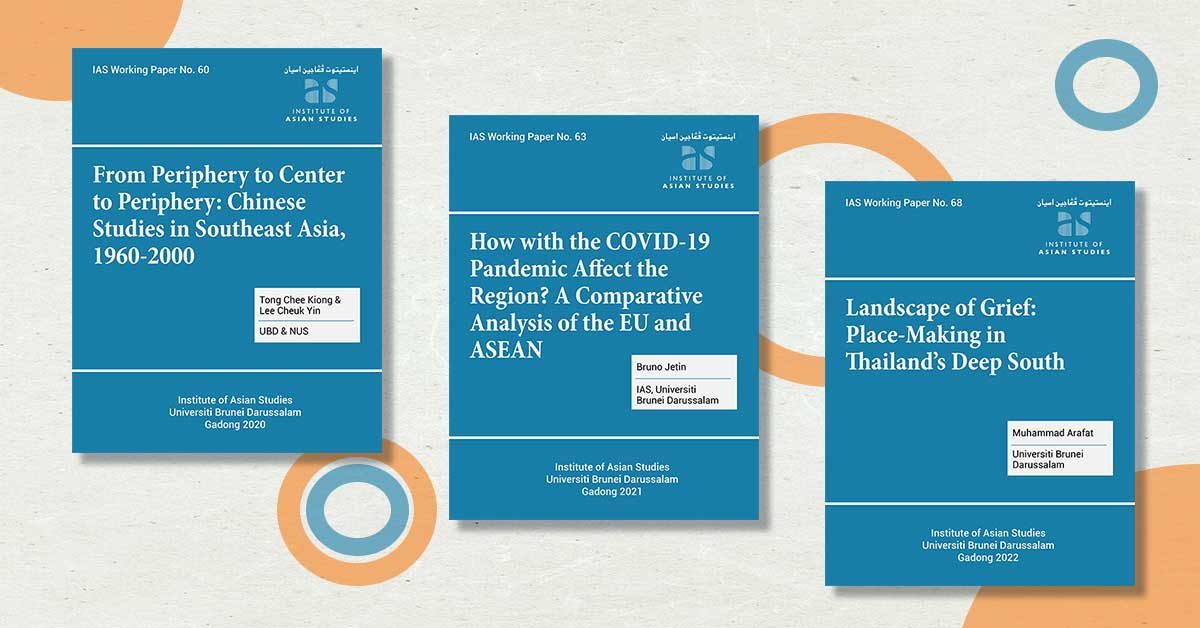
Click on a Title to Download the Full PDF
Working Paper No. 60
Tong Chee Kiong & Lee Cheuk Yin
This paper examines the contribution of overseas scholars to Chinese studies.
Given that eighty percent of the Chinese diaspora are located in Southeast Asia, it pays particular attention to social science scholarship in the region. The work of scholars in religion and ethnicity are highlighted. . .
Working Paper No. 61
Ade Roddiane bin Haji Mohd Rosdi and Paul J. Carnegie
The South China Sea is a significant maritime region both strategically and economically. Its valuable resources provide major economic benefits for the countries of the surrounding region. Maintaining the maritime security of Brunei’ territorial waters and Exclusive Economic Zone (EEZ) against illegal activity is key to ensuring the long-term viability of its benefits for the country. This paper considers the effectiveness of maritime co-ordination and information sharing in combatting illegal fishing activities within Brunei Darussalam’s EEZ and the challenges it faces.
Working Paper No. 62
T.P.M. Adi Nabil Fadzillah and Chang-Yau Hoon
This paper explores various notions of masculinity among young Malay men in Brunei Darussalam. Using interview data from 16 male and female informants, it elucidates other forms of self-expressions and identities in contrast to the stereotypical and traditional notion of masculinity.
While the data attest to the normative values and ways of being men recognized by the mainstream society and institutions in Brunei, it also found a significant “modern” approach and perception of expressing different notions of masculinity.
This pilot study sheds light on the norms and values that define and shape masculinity among young Malay men within their socio-cultural contexts of contemporary Brunei Darussalam.
Working Paper No. 63
The COVID-19 pandemic calls for a collective response at the global and regional level. Otherwise, some nations may be left behind and the potential for the contagion to return remains high.
As advanced regional blocs, the EU and ASEAN have a major responsibility to their members for coordinating health protection measures and access to vaccines, maintaining the mobility of people and goods, and supporting their economy. The pandemic is therefore a test for regions. They must demonstrate that they are at least making national measures more effective.
This paper seeks to determine whether the EU and ASEAN have passed the COVID-19 test. It does so by analysing their responses in 2020 when the countries were hit by the first wave of contagion.
The first section of the paper considers their attitude and action when the initial cases appeared in Europe and Southeast Asia in the early part of 2020. While the second section focuses on vaccines and the policies adopted in each region.
The paper concludes that overall, the responses of the two regions to their COVID-19 test were late and insufficient.
Working Paper No. 64
Caroline Anne Yong Suk Zhen, Siu Tzyy Wei, and Paul J. Carnegie
This paper considers whether regional digital partnership offers an effective strategy for post-pandemic recovery.
To ground the paper in critical reflection, we combine personal impressions of our current situation with a discussion of the ways to achieve meaningful digital partnership.
Drawing on work as varied as Thomas Kuhn, Bong Joon-ho, Nikolai Kondratieff and Piyawat Sivarak, the paper argues that our future wellbeing is predicated on our ability to bridge the digital divide and cooperate effectively for mutual benefit.
Working Paper No. 65
Victor T. King and Magne Knudsen
This paper is based on fieldwork on selected Iban communities in Temburong, Brunei Darussalam during research visits there between 2018 and 2021.
In Brunei, the Iban are a minority population of about 20,000 and, in terms of its Constitution and the Nationality Act of 1961, they are not considered as one of the recognised indigenous populations (puak jati) of the state. Despite being marginal to the Brunei state, they have chosen to make their home here and enjoy the support and the employment opportunities that the state provides.
This paper aims to fill a gap in Iban Studies by providing recent data on the Temburong Iban’s social organisation, economic activities and cultural identity in conjunction with their responses to their minority status in Brunei. It is also an ethnographic prelude to a prospective major study of the Iban of Brunei.
Working Paper No. 66
Aris Ananta, Evi Nurvidya Arifin, Ari Purbowati, and Paul J. Carnegie
It is a commonly held assumption that while migrants can contribute to economic growth, their impacts on population composition may also generate socio-cultural tensions and political instability. As such, ethnic diversity of a province or a community may have a positive or negative affect on regional development. This raises the question of whether impacts of migration on ethnic diversity correlate with economic growth.
Taking Indonesia as the locus of the study, the following paper presents new empirical data in response to that question. By analysing statistics on ethnic groups and regional composition derived primarily from the Indonesia 2010 Population Census and cross referencing them with recent ethnic classifications and fractionalisation and polarisation indexes, a fuller overview of ethnic diversity across the archipelago and its relationship to migration and economic growth is gained.
Based on the data, a mixed pattern emerges on the role ethnic diversity plays in intermediating the relationship between migration and economic growth. The findings suggest a correlation between indicators of ethnic diversity and economic regions but in less developed regions in particular, other variables also modulate the relation between migration and economic growth. While ethnic diversity appears to be a primary variable in more developed regions.
Working Paper No. 67
Lian Kwen Fee, Yabit Alas, Tong Chee Kiong, and Faizul Ibrahim
The etymology of the term ‘Dusun’ is disputed. It has been attributed to British colonialists to refer to a place where people practised horticulture and to the Brunei Malays to describe orchard or countryside. Over time, as a consequence of official ascription, it has been accepted by the indigenous community itself, even though the Dusun themselves initially preferred to call themselves Sang Jati (our people).
In this paper we address the question of what is Dusun identity and who are the Dusun by examining the work of local and foreign scholars and the views of informants who have been influential in the community.
Equally important, we also identify critical issues that have dominated the work of these scholars and assess their relevance to current and future research on the Dusun. These issues include ethnic identity and religion, ecology and language, and kinship and leadership. We come to the conclusion that ecological variations matter.
Future research should address how the Dusun are represented and essentialised and recognise the diversity of ‘Dusunness’ today.
Working Paper No. 68
Places are social constructs. They become individuated and significant when imbued with meaning through people’s lived experience, usage, and imagery.
This paper discusses the construction of Patanian places in Thailand’s Deep South, a region consisting of the provinces of Pattani, Narathiwat, and Yala, where the Malays constitute the ethnic majority.
Using the Krisek Mosque, the Tomb of Sultan Ismail Shah, and the former home of Haji Sulong as examples, the paper shows how Patanian Malay narratives about these places illustrate their sorrow about the demise of the historical Malay kingdom of Patani and their community’s strained political relationship with the Thai state and nation.
Viewed collectively, these places constitute a landscape of grief for the Patanian Malays.
Working Paper No. 69
Due to geopolitical tensions, such as those brought about by COVID-19 and the US-China trade war, many multinationals have been closing factories in China and relocating to countries along the Mekong such as Vietnam, Cambodia and Laos.
As a result, these countries will inevitably experience more international commerce in the future and attention will focus on their legislative and judicial systems. While much has been written about these countries’ laws, scant attention has been paid to a common feature in their development, the pervasive influence of Japanese private law.
Since 1996, the Japan International Cooperation Agency (JICA) has played a major role in the modernization of law in the region. Through its Legal and Judicial Development Project, JICA has provided technical assistance for the reform of codes and the training of lawyers in the use of those codes.
This paper critically examines JICA’s contribution to the rule of law in the region. It considers whether Japanese soft power (as manifested by JICA) complements or is at cross-purposes with projects of other organisations and initiatives (such as, Asian Development Bank and World Bank).
It then evaluates the extent to which JICA’s work is currently attuned to or has the potential to be made more responsive to the social and economic aspirations of the relevant countries.

